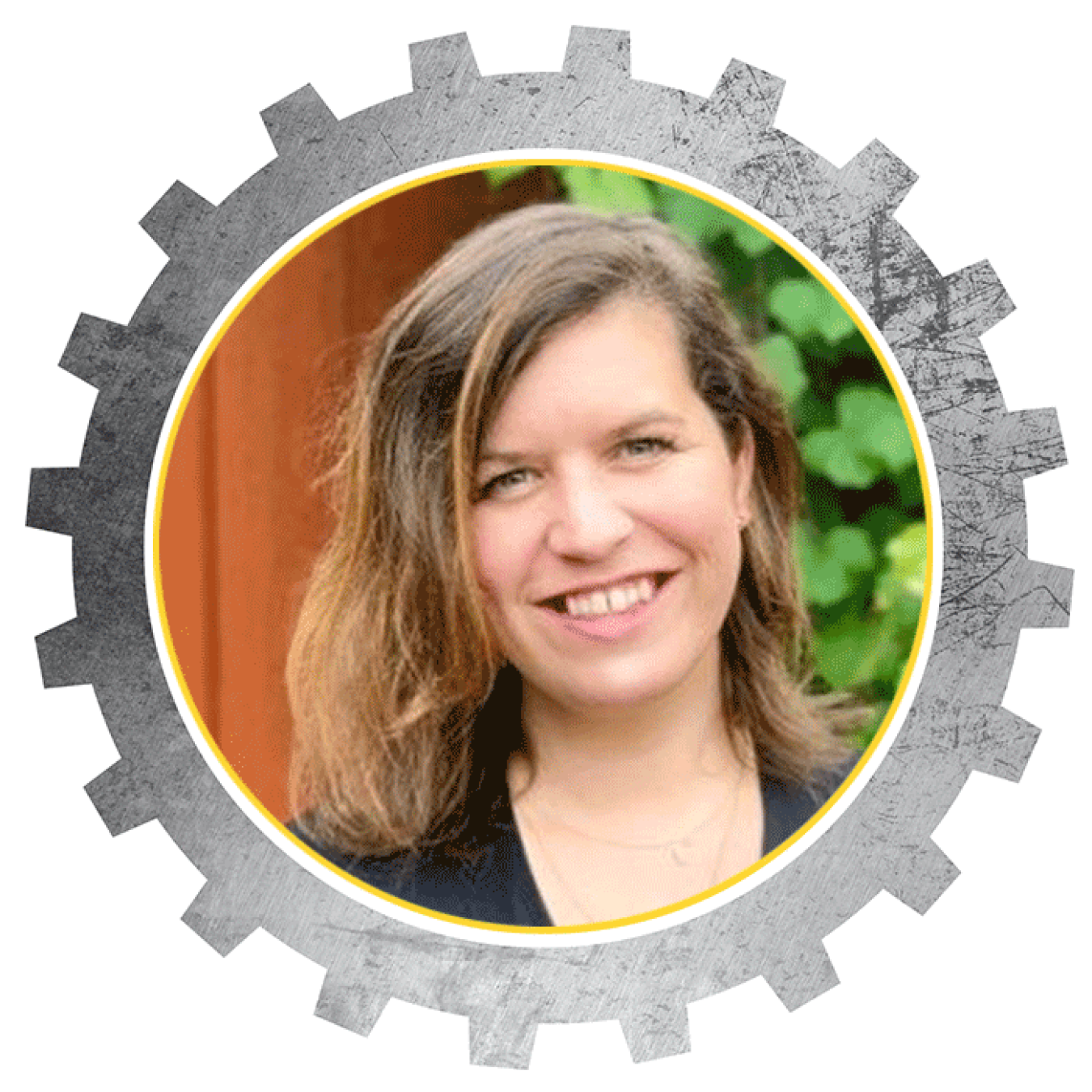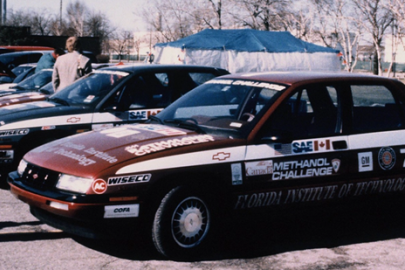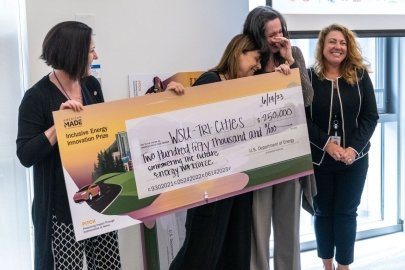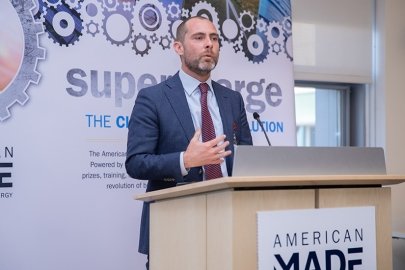Prize competitions at the U.S. Department of Energy are designed to make it easier and quicker for American innovators to develop clean energy technologies, launch businesses, and increase U.S. manufacturing.
Office of Energy Efficiency & Renewable Energy
September 18, 2023Part 2: Ready, Set, Go!
Prize competitions at the U.S. Department of Energy (DOE) are designed to make it easier and quicker for American innovators to develop clean energy technologies, launch businesses, and increase U.S. manufacturing. Designing competitions to achieve these goals, however, required research.
In 2015, Jennifer Garson and Victor Kane began working to understand what American-made startups would need to compete and succeed in the marketplace. They were looking for something that did not already exist. Building on lessons learned from the small business voucher program and Energy I-Corps, they began exploring how they might assemble a network of experts to support anyone who could meet significant milestones.
The American-Made Challenges is empowering change-makers to lead the clean energy revolution through training, teaming, connections, mentoring, and funding.
They recognized the need to structure competitions in stages with progressive cash prizes. Doing so bridged the “valley of death”—the critical phase when a startup begins operating with no revenue, relying only on initial invested capital—that is known to derail entrepreneurial innovation. This model became the foundation of DOE’s American-Made Challenges (AMC) prize competition series.
Garson and Kane also identified what was missing. DOE was already equipped with connections that provide technical assistance to communities, utilities, and industry. However, individuals needed the ability to easily—and freely—access these support systems. A solution came in the form of vouchers. This addition gave competitors an open door to testing and fabrication facilities at DOE’s nationwide network of laboratories, as well as other tools and resources. Technical assistance vouchers became the foundation of the American-Made Network.

“We needed to leverage a broad network that we knew existed, but weren’t tapped in to yet, to propel a whole new set of startups.”
It took time for the idea to gain support, partly over concerns that competitors might not finish developing their technology after winning a cash prize early on, but it gained traction as Garson earned the confidence of DOE leadership. Their willingness to try something new revolutionized the ability for anyone to launch a clean energy business in America.
Can You Vouch for Me?
Have an innovative idea? Enter a prize competition that’s right for you.
In the first five years since launching in 2018, the American-Made Network has expanded to include more than 400 technology incubators and accelerators, venture capital firms, angel investors, and industry representatives. Anyone can contribute. The Network now spans nearly all 50 states, providing competitors with access to the connections and facilities they need to succeed.
“There’s nothing holding them, there’s no contract—our partners are doing it because it’s working for them,” says Peter Lobaccaro, former technology manager at the Solar Energy Technologies Office who led the development of the American-Made Solar Prize and the American-Made Network.
The first American-Made Challenge, the Solar Prize Round 1, launched in 2018 with three stages: Ready! Set! and Go! The award money increased incrementally as teams achieved the contest goals and moved on to the next phase. To drive progress, DOE required teams of competitors to incorporate as small businesses before working toward the prize goal, which was transforming back-of-the-envelope ideas to pilot-ready prototypes.
“We focused on right-sizing the prize amounts to keep people engaged and working, so it would always provide enough money to keep them advancing to the next level,” says DOE general counsel Michael Goldstone, who reviews official prize rules. The rules state what competitors can win in each phase, so they know what they’re working toward.
A panel of expert reviewers selected 20 semifinalists to receive $50,000 each in the first phase, then narrowed down the pool to 10 finalists who received $100,000 in funding and $75,000 in vouchers in the second phase. Two winners were chosen to receive $500,000 in cash and up to $75,000 in vouchers in the final round.
The next AMC competition, the FAST Commissioning for Pumped-Storage Hydropower Prize, launched in April 2019. Two months after FAST launched, the Waves to Water Prize opened to incentivize development of small wave-powered systems that remove salt from ocean water. These early American-Made Challenges offered an entry point for clean energy entrepreneurs whose ideas weren’t fully baked enough to compete for DOE’s funding opportunity announcements (FOAs).
“FOAs are good for big-investment, years-long projects that DOE oversees,” Garson says, “but for rapid acceleration of ideas, or to just generate new concepts or fund people who’ve never received federal funding…that’s where prizes are unparalleled to anything else we have in the federal government.”

“Competitive prize programs complement our traditional grant and cooperative agreement awards. To meet our decarbonization and climate goals, we're going to need a vast network of diverse innovators developing new ideas. When those changemakers succeed, they bring everyone along for the ride.”
Kane says, “FOAs and prizes are better when they both exist. Prizes seed the community and technology development for FOAs. They make each other stronger.”
With this complementary pair of funding mechanisms, DOE is better positioned to grow the national innovation ecosystem, create jobs, support U.S. competitiveness, and address climate change.
Read the Rest of This Four-Part Series
-
 The U.S. Department of Energy had to invent new options for funding start-ups because the effects of climate change were outpacing technology commercialization.
The U.S. Department of Energy had to invent new options for funding start-ups because the effects of climate change were outpacing technology commercialization. -
 Prize competitions at the U.S. Department of Energy are designed to make it easier and quicker for American innovators to develop clean energy technologies, launch businesses, and increase U.S. manufacturing.
Prize competitions at the U.S. Department of Energy are designed to make it easier and quicker for American innovators to develop clean energy technologies, launch businesses, and increase U.S. manufacturing. -
 The U.S. Department of Energy launched the first American-Made Challenge in 2018 to attract more diverse American innovators and accelerate commercialization of clean energy technologies.
The U.S. Department of Energy launched the first American-Made Challenge in 2018 to attract more diverse American innovators and accelerate commercialization of clean energy technologies. -
 The U.S. Department of Energy leveraged American-Made Challenge Prize competitions to get capital to clean energy organizations that were previously unable to access traditional federal funding resources.
The U.S. Department of Energy leveraged American-Made Challenge Prize competitions to get capital to clean energy organizations that were previously unable to access traditional federal funding resources.







